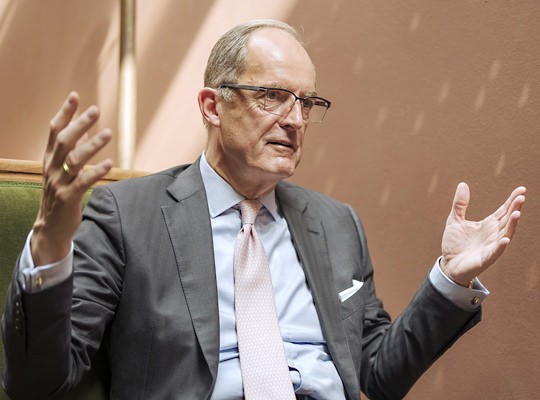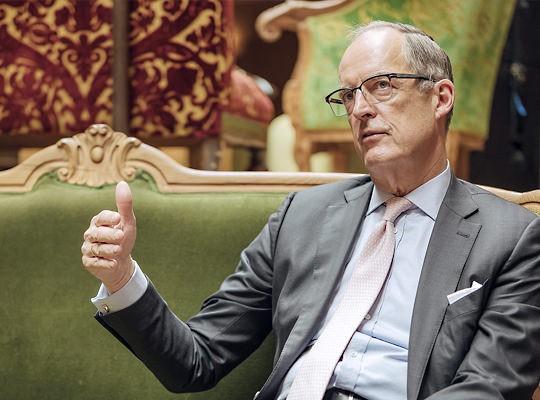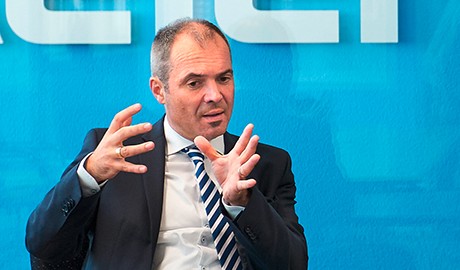Interview with Gisbert Rühl, the CEO of Klöckner & Co.
“We want to revolutionise the industry”
The steel trade is deemed highly conservative. But that won’t deter Klöckner & Co. CEO Gisbert Rühl from daring to take a radical step towards digitisation. He’s using start-up methods to shake up an entire industry - with increasing levels of success.
Text: Hansjörg Honegger, Images: Daniel Brühlmann, 16 october 2017
The steel trade is highly conservative. As the CEO of Klöckner & Co., a major, international and independent steel distributor, you are considered an innovator, even in sectors far removed from steel. What spurs you on?
Our industry has been under the cosh for years. Digitising our industry represents a chance for us to become pioneers and actively initiate change within it. We have the opportunity to revolutionise an entire industry. That’s what spurs me on.
How did you approach that?
We initially created our own innovations group internally, which was moderated by an external professor. With this group, we tried to quickly develop ideas for innovations in our industry. We initially failed with this approach.
«There were several naysayers ready to immediately shoot down any new idea raised in our internal innovations group.»
Why is that?
We struggled to change our ingrained mindsets. There were several naysayers ready to immediately shoot down any new idea raised in our internal innovations group. This was particularly the case for approaches that challenged the status quo. The general attitude was that “steel distribution does not work like that”, “that won’t work for us” and so on.
What conclusions were you able to draw from this?
We recognised that we need to break away from our established structures. That’s why we formed kloeckner.i in Berlin. Our hotbed of change, which worked as an independent innovations unit from the start. It functions like a start-up. The employees there are almost exclusively Digital Natives from the start-up scene who have brought new skills and fresh perspectives to our company.
What do start-ups do differently?
Start-ups focus purely on customers and initially develop very simple solutions (MVPs, or Minimum Variable Products) that merely cover basic functionalities. These solutions are then enhanced further together with the customers. This way of doing things was the polar opposite to the Group’s standard approach. Far too often, the previous way of working tried to cover every conceivable functionality from the get-go. Even things that the customer possibly didn’t even need.
Independence was worthwhile then?
In principle, yes, but ultimately it is crucial to strike the right balance between keeping close ties with a parent company and going it alone. If a spin-out like this becomes overly independent, there is no transfer of knowledge and the ideas that have been developed are often rejected. If the spin-out is too close to the parent company, then momentum is lost and they will lose their new employees at some stage. We’ve struck the perfect balance now between taking advantage of our knowledge of the industry and long-standing customer and supplier relationships, yet retaining the moxie of a start-up.
«That is very typical of the start-up environment: asking questions and trying to learn.»
Why didn’t you simply establish your own - independent - department within your parent company?
Digital Natives and, in this case, particularly those coming to us from abroad want to go to hotspots because that is where they get to meet their kindred spirits. We cannot offer this from our headquarters in Duisburg, no matter how we set up the premises. It might look like a start-up, but it’s nowhere near. Therefore, we moved to Berlin where we now employ over 60 staff from 14 different countries.
Did anyone within the Group have any reservations concerning the new kids on the block from Berlin?
Interestingly, there wasn’t a clash of cultures and that remains the case. Our people in Berlin are going down well within the company because they ask questions and show an interest in business operations. That is very typical of the start-up environment: asking questions and trying to learn.
What about actual output?
We have already managed to develop various digital tools such as Online Shops, contact portals and order overviews and provide these to an ever-increasing customer base. And with positive results. For example, as early as August 2017, we managed to grow the Group’s share of turnover generated from digital offerings to 17 per cent - double the figure as at the start of 2016. What’s more, we laid the foundations for an open industry platform that we will use as an MVP to go live in Europe at some point this year. The progress made in changing the culture towards digitisation within the company also can’t be sniffed at.
What do you mean, exactly?
Through in-depth communication with many of our employees, we have managed to bring them into the digital age. As a result, they understand our digitisation strategy and know how to contribute to making digitisation a reality. They also adopt increasingly agile working methods from the start-up scene and act in a less pernickety manner than they did in the past. We as an organisation have thereby become much faster and more agile overall.

What gave the employees the most concern?
Job retention. For instance: a salesperson needs to convince a customer to make an order online. But why should they do that if they fear it will threaten their job? In this case, it is worth explaining and demonstrating in depth that although the work may change, their jobs will not be phased out. For example, by taking simple administrative activities away from sales staff, they will have more time in future to focus on consultation-intensive business. This is the kind of information we provide at DigiDays, for example, where each day is dedicated to educating a branch's employees by delving deep into a digital topic. We explain our digitisation strategy in simple and clear terms in DigiBooks. We also use Yammer, an internal social network where employees can hold discussions and also ask me questions directly.
You have about 9000 employees on your books. Even if only 200 of them leave a comment on one of your posts, doesn't that eat up all of your time?
Not an issue. There’s rarely more than ten comments. Not everybody has the courage to send a publicly visible response to the CEO. However, even I had to learn the ropes first before communicating via a social network.
What have you learned?
I can’t just give a statement. Instead I tend to appear as a moderator. If I notice something then I ask questions. For example, I will ask about what is not working or going wrong and how we can set about improving this in future. This often involves starting very productive discussions. Many things almost sort themselves out as a result.
A culture of learning from mistakes is an important topic in any case. You run a so-called “FuckUp Night”. What is that?
We picked that up from the start-up scene. Failed founders recall their mistakes at these events and talk about what went wrong. So we simply took that as a blueprint with someone standing in front of a group and talking about past mistakes. Our first night was held in summer with a mixed group of company execs and remote staff. Previously, we would have set up a major project with a great deal of co-ordination in advance. Now we simply try it out and change the approach if need be.
«Only by talking about errors and drawing the necessary conclusions from them can we avoid repeating them.»
Admitting an error in the public sphere is a delicate issue.
Sure, it requires a certain degree of seniority. That’s another reason why I started doing this. We have created a pressure-free environment - nobody is forced to go up onstage. It’s all about an active culture of learning from mistakes: anybody who tries something new must also be allowed to make mistakes. It’s absolutely necessary to learn from mistakes! For example, three days after introducing a new pricing model, we got rid of it because it did not work. Only by talking about errors and drawing the necessary conclusions from them can we avoid repeating them.
To try something out, you need two things: support from the board and capital.
We are in a period of investment, even the board is agreed on that. We are investing in the future and have provided additional funds for that, so it’s not just a case of cutting back elsewhere.
How much, exactly?
Between 25 and 30 million euro as it stands.
When will you see a return from this capital expenditure?
It’s already happening. Today, thanks to the growing online business, we are already making initial repayments. Although they aren’t enough to cover all the costs, we’re on the right track.

You are the de facto Chief Digital Officer. At other companies, this role tends to be occupied by trendy 30-year-olds, not a distinguished CEO over 50 in a tailored suit.
If you simply take someone from the start-up scene or from Silicon Valley and appoint them to that kind of position, they are often not accepted within the company. That’s why I took it on myself. Another reason is that the CEO has to fully support fundamental digital transformation rather than just delivering a few soapbox speeches.
How do you gain the skills to make the correct decisions?
I have a good team at my side that offers me advice. I also personally spend a lot of time in the tech and start-up scene to talk with experts and acquire knowledge. However, to clarify: you have to be able to make mistakes and then acknowledge and correct them.
Where will Klöckner be in 10 years’ time? Will you still be selling steel?
I don’t have a crystal ball but my guess is that with such a strong team, we will be selling even more steel than we do today. I’m convinced that digitisation will help us to consolidate the market and that we will grow again, not just through platforms but in terms of physical business as well. Our success is already apparent today: we are becoming more competitive than our conservative rivals.
What is your proudest achievement?
The fact that the change in culture, a prerequisite for digital transformation to succeed, is gaining traction. Many initiatives are being started now, unbeknownst to me, e.g. DigiDays. Plus our IT department also develops MVPs now. Our employees’ creativity, when they have the right environment, amazes me no end. It is much harder to motivate people than to roll out technology. We now manage to do both. That makes me proud!
Klöckner und Co.
Klöckner & Co. is one of the world's largest producer-independent steel and metal distributors and one of the leading steel service centre companies. The Group serves approximately 130,000 customers via its distribution and service network spanning around 170 locations in 12 countries. As a pioneer of digital transformation in the steel industry, Klöckner & Co. has set itself the aims of completely digitising its supply and service chain and of expediting the rollout of an open and independent industry platform that it expects to become the leading vertical platform in the steel and metals sector.
Gisbert Rühl
Gisbert Rühl has previously held a number of executive positions in the industry and consulting business. In 2005, he joined the board of Klöckner & Co. Group in his capacity as CFO, before being elected to his current position of Chairman (CEO) in 2009. Gisbert Rühl is currently turning his full attention to the promotion of Klöckner & Co.’s digital transformation as well as the development of an open industry platform that will help the company to assume a leading position in the steel industry.

Newsletter
Would you like to regularly receive interesting articles and whitepapers on current ICT topics?
More on the topic

